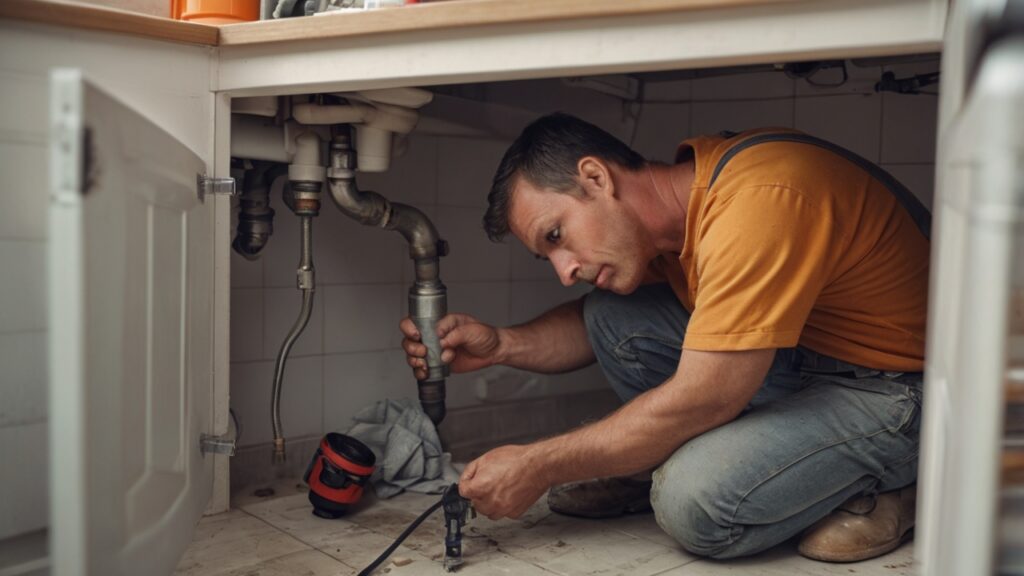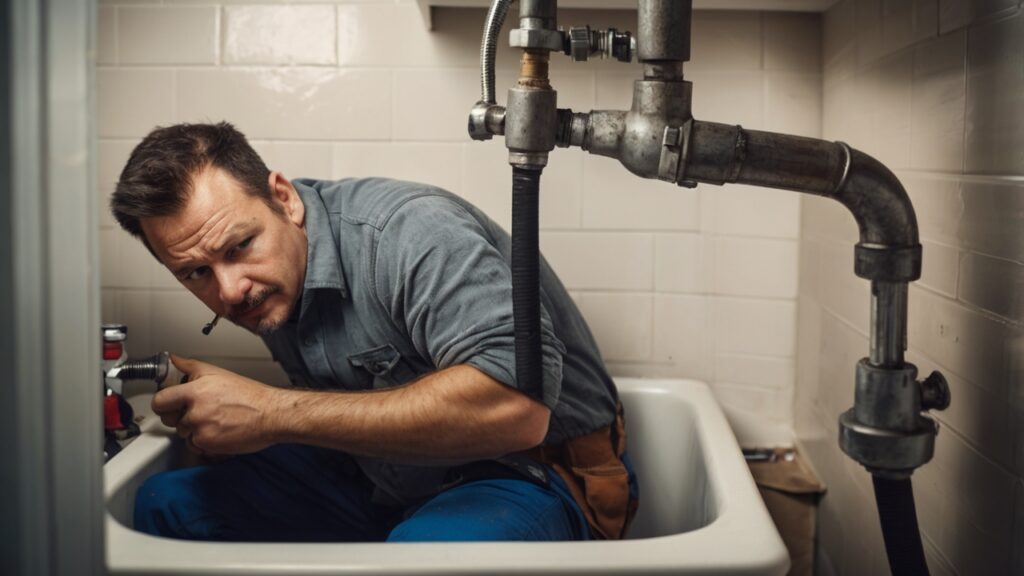Keeping a house running smoothly often looks simple from the outside. A faucet drips, a toilet clogs, a pipe rattles—you call a plumber, and it’s handled. But the truth is, there are a lot of things hiding underneath your floors and behind your walls that aren’t so obvious. Problems like clogged sewer lines, hidden leaks, and bad water quality don’t just fix themselves. They build up, and before long, you’ll realize that “small leaks—big problems” isn’t just a catchy phrase—it’s a hard truth.
That’s where specialized plumbing services come in. These aren’t just your regular wrench-and-plunger fixes. We’re talking about sewer line inspections, professional water filtration systems, smart plumbing technology for homes, and the choice between hydro-jetting vs snaking when drains act up. Many homeowners don’t even know these exist until disaster hits. And that’s a shame, because treating plumbing as a proactive home improvement instead of a reactive repair can save thousands of dollars, not to mention headaches.
I’ve personally seen how neglecting a hidden issue spirals out of control. A neighbor of mine had tree roots breaking into their sewer line. They didn’t know until sewage backed up into their basement. If they had called for a sewer line inspection earlier, the fix would have been a lot cheaper—and less smelly.
So let’s expand beyond the basics. Below are the specialized plumbing services every homeowner should know, plus a few other ideas for keeping your house safe, healthy, and efficient.
What Is a Sewer Line Inspection?
The phrase sounds intimidating, but it’s pretty straightforward. A sewer line inspection means a plumber uses a special camera system attached to a flexible rod to go through your pipes. The camera transmits real-time video, showing clogs, cracks, or tree root intrusions.
I remember the first time I saw this in action—it’s like watching a horror movie inside your pipes. Slimy buildup, creepy roots, even a stray toy flushed down years ago. But that “inside look” can prevent future disasters.
According to David H., a master plumber with 20 years of experience, sewer inspections “should be part of regular home maintenance every 3–5 years, especially for older homes.” He adds that fixing a blockage early is always cheaper than repairing a collapsed line.
Without inspection, you’re basically blind to what’s happening underground. And blind trust in plumbing never ends well.
The Benefits of Professional Water Filtration Systems
Water looks clean, but that doesn’t mean it is. Tap water can carry sediments, chlorine, bacteria, and even heavy metals like lead in older piping systems.
Installing a professional water filtration system is one of the smartest moves a homeowner can make. Unlike those small store-bought filters that only handle one faucet, whole-home systems clean the water before it even enters your pipes. This means better taste, healthier showers, and longer-lasting appliances like washing machines.
I installed one at my parents’ house, and the difference was shocking. Their kettle stopped building up that gross chalky layer, and my mom swears her skin feels less dry. It might sound like an exaggeration, but little changes like that improve everyday life.
Experts point out that filtration doesn’t just benefit health. It also prevents mineral buildup inside pipes, which can add years to your plumbing system. So you’re not just drinking cleaner water—you’re protecting your home’s value.
Smart Plumbing Technology for Homes
We live in a world where thermostats talk, refrigerators text, and lights listen. Plumbing has caught up too. Smart plumbing technology is now part of the modern home, and honestly, it’s pretty impressive.
- Leak detection sensors send alerts to your phone when a pipe drips.
- Smart water shut-off valves automatically cut off the supply during a burst.
- Connected water heaters let you track energy use and set heating schedules.
A buddy of mine installed a leak detection system after his basement flooded twice. The second time, he swore it wouldn’t happen again. Months later, he got an alert on his phone while on vacation. A pipe in his kitchen had started leaking. The system shut the water off automatically, and he avoided a $15,000 repair bill.
Sure, it’s an investment up front. But so are car airbags—and no one calls those unnecessary.
Why You Need a Drain Cleaning Professional
Clogged drains are annoying, but here’s a secret: DIY fixes like chemical cleaners often do more harm than good. They eat away at your pipes, especially older ones.
That’s why having a drain cleaning professional is worth it. These experts use specialized tools that don’t destroy your system. More importantly, they know whether a clog is a simple grease trap or a symptom of something much worse, like a collapsed line.
I once tried to “save money” by clearing my own kitchen sink clog with a store-bought drain snake. Long story short, the snake snapped inside the pipe. I ended up calling a plumber anyway, and it cost me double. Lesson learned: some jobs just need a pro.
Hydro-Jetting vs Snaking
This debate is more common than you’d think. Hydro-jetting and snaking are two different methods of unclogging drains.
- Snaking: A long, flexible metal coil is pushed into the pipe to physically break up clogs. It works for small blockages but doesn’t clean the pipe walls.
- Hydro-jetting: Uses high-pressure water jets to blast away grease, roots, and buildup. It’s like power-washing your plumbing system.
Plumbers often describe snaking as a quick fix and hydro-jetting as a deep clean. If you want your pipes restored almost to “like new” condition, hydro-jetting is the way to go.
But don’t just trust marketing—hydro-jetting uses powerful pressure that, in the wrong hands, can damage older pipes. Always hire a reliable professional who knows the system’s limits.
Beyond These Five: Other Issues Worth Watching
Specialized plumbing services go far beyond the list above. For future blog development, there are other areas homeowners should definitely know about:
- Gas line inspections and repairs – vital for safety.
- Water pressure regulation – too much pressure damages appliances.
- Slab leak detection – leaks hidden under concrete floors can destroy foundations.
- Backflow prevention devices – protect drinking water from contamination.
- Greywater recycling systems – eco-friendly, great for gardens.
Each of these deserves its own article. (And don’t worry, we’ll cover them in detail in future posts.)
Real-Life Case Study: A Costly Overlook
To make this practical, let’s look at an example. A family in Charlotte, NC, ignored slow drains for months. They tried every DIY trick—boiling water, store-bought chemicals, plungers. Nothing worked long term.
Finally, sewage started backing up into their shower. A plumber performed a sewer line inspection and discovered roots had invaded the main pipe. Hydro-jetting was used to clear it, followed by lining the pipe with epoxy resin.
The family later admitted they spent over $400 on temporary DIY products before calling a pro. The total bill for professional repair? Around $1,800. Expensive, yes—but a full sewer replacement would have cost $12,000. Their only regret was not calling sooner.
Related Reading
If you want to explore more on plumbing, here are some guides we’ve already covered:
- Small Leaks – Big Problems
- DIY Plumbing vs. Hiring a Pro
- Your Step-by-Step Guide to Responding to a Burst Pipe
- Specialized Plumbing Services Every Homeowner Should Know
- How to Find a Reliable Plumber
And of course, check out the main pillar post here: Recommended Plumbing Companies in North Carolina or visit Pro Service Tips.
FAQs
1. How often should I get a sewer line inspection?
Most experts recommend every 3–5 years, or sooner if your home is older or you’ve had repeated clogs.
2. Is hydro-jetting safe for all pipes?
Not always. It’s highly effective but can damage old or brittle pipes. A trusted plumber will evaluate your system first.
3. Are smart plumbing devices worth the cost?
Yes, especially leak detection systems. They may seem expensive upfront, but they can save thousands in water damage repairs.
Specialized plumbing services aren’t just fancy extras—they’re proactive ways to protect your home, health, and wallet. Whether it’s investing in professional water filtration, upgrading to smart plumbing technology, or calling a drain cleaning professional instead of using chemicals, the key is to think ahead.
Don’t wait for a flood, a burst, or a nasty backup to remind you. Start treating plumbing like the foundation of your home’s comfort that it really is.
If you found this article helpful, please share it using the buttons below. You never know who in your circle might be dealing with a hidden plumbing nightmare right now.


